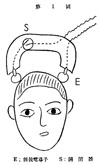Abstract
This review describes the types of psychiatric treatment studied during the Japanese colonial period of 1910–1945 in Korea, known at the time as Chosun. Twenty-nine research papers and abstracts on psychiatric treatment were reviewed, which were published in the Shinkeigaku-zassi (Neurologia), the Seishin-shinkei-gaku zassi (Psychiatria Et Neurologia Japonica) and the Journal of Chosun Medical Association, by faculty members of the department of neuropsychiatry, Chosun-Governor Hospital and Keijo (Seoul) Imperial University School of Medicine. The major research area was biological psychiatry and biological treatment, as Japanese pioneers in psychiatry at that time had introduced German psychiatry into Japan. Professor Kubo published the most papers, followed by Dr. Hattori, Dr. Hikari, and Professor Suits. In Chosun-Governor Hospital, research on prolonged sleep therapy was an active field. In the Imperial University Hospital, malarial fever therapy, sulphur-induced fever therapy, and insulin shock treatment were the most frequent research topics. Some were tried for the first time in the Japanese Empire, which reflected the pioneering position of the university. These achievements are attributed to Professor Kubo. Six papers on psychotherapy were published. Among them, two papers were on persuasion therapy, three papers were case reports of psychoanalytic therapy, and one paper on Freud. However, this psychoanalytic therapy research seemed to be limited trials conducted following literal guidance, and no further development was noted. Generally, research was characterized by simple design, small numbers of subjects, lack of objective evaluation method, lack of statistical treatment, and especially lack of ethical consideration comparing with today's standard.
References
1. Rhi BY. Government in Korea with the special reference to the clinical activities at the Colonial Governmental Hospital: 'Chosun-Chong-Dok-Bu Ui-Won' (1913-1927). Korean J Med Hist. 1994; 3:147–169.
3. Chung WY. History of modern western psychiatry in Korea. From early 1920s to 1945 [dissertation]. Seoul: Seoul National University;1997.

4. Lee NM, Rhi BY. The introduction of the Western Psychiatry into Korea (1): from the mid seventeenth century to 1911, the time of Japanese forced annexation of Korea. Korean J Med Hist. 1999; 8:233–268.
5. Lee HY. Past, present and future of Korean psychiatry. Psychiatry Investig. 2004; 1:13–19.
6. Chung W, Lee NM, Rhi BY. The introduction of Western Psychiatry into Korea (II) Psychiatric Education in Korea during the forced Japanese annexation of Korea (1910-1945). Korean J Med Hist. 2006; 15:157–187.

7. The Department of Psychiatry, Yonsei University College of Medicine. The Foundation of the Department of Psychiatry, Severance Union Medical School. Seoul: The Department of Psychiatry, Yonsei University College of Medicine;2006.
8. The Department of Psychiatry, Seoul National University College of Medicine. History of the Department of Psychiatry, Seoul National University College of Medicine. Seoul: The Department of Psychiatry, Seoul National University College of Medicine;2008.
9. Yeo IS. The establishment of SUMC (Severance Union Medical College) psychiatry department and the formation of humanistic tradition. Korean J Med Hist. 2008; 17:57–74.

10. Korean Neuropsyciatric Association. One hundred years' history of psychiatry in Korea. Seoul: Korean Neuropsyciatric Association;2009.

11. Min SK. Professor Charles I. McLaren (1). His life and medical philosophy. J Korean Neuropsychiatr Assoc. 2011; 50:172–186.
12. Min SK. Professor Charles I. McLaren (2). His theories of psychiatry. J Korean Neuropsychiatr Assoc. 2012; 51:25–35.
13. Min SK. Faith and life achievement of Professor McLaren. Seoul: Yonsei University Press;2013.
14. Min SK, CH Lee, Lee KB. Research by psychiatrists of Chosun Chongdokbu Hospital and Keijo Imperial University in Korea during Japanese colonial rule. J Korean Neuropsychiatr Assoc. 2015; 54:142–171.
16. Kanekawa H. [Academic presentation of neurology and psychiatry of Keijo Imperial University at annual meetings]. Seishin Shinkeigaku Zasshi. 2012; 114:1180–1186.
17. 1916. (14):64–66.
18. 1927. (82):66–77.
19. 1924. (47-52):79–83.
21. 1927. 27:444–448.
22. 1932. 34:537.
23. 1932. 22:111.
24. 2002. p. 198.
25. 1935. 38:625–626.
26. 1939. 29:234–240.
27. 1932. 22:58–78.
28. 1933. 35:609–651.
29. 1933. 35:692–728.
30. 1933. 36:68–110.
31. 1933. 36:250–255.
32. 1932. 22:107–108.
33. 1934. 37:363–365.
34. 1935. 38:602–604.
35. 1937. 41:553–557.
36. 1936. 40:608–610.
37. 1937. 41:452–453.
38. 1939. 43:448.
39. 1940. 30:71–73.
40. 1931. 21:106–132.
41. 1921. 32:89.
42. 1923. 24:244–248.
43. 1926. 26:314–326.
44. 1929. 11:202.
45. 1930. 20:167–178.
46. 1930. 20:178–182.
47. 1936. 40:661–697.
48. Hashimoto A. A 'German world' shared among doctors: a history of the relationship between Japanese and German psychiatry before World War II. Hist Psychiatry. 2013; 24:180–195.

49. Ishida N. Results produced in dementia praecox or so-called "endogenous dementia" by the infusion of sodium chloride solution. Am J Psychiatry. 1917; 73:541–547.

50. 1988. p. 263–276.
51. 1932. p. 364–365.
52. Beckman H. A brief review of fever therapy in neurosyphilis. Arch Derm Syphilol. 1933; 28:309–319.

53. Tsay CJ. Julius Wagner-Jauregg and the legacy of malarial therapy for the treatment of general paresis of the insane. Yale J Biol Med. 2013; 86:245–254.
55. Menzies D. Pyrotherapy in dementia praecox. Lancet. 1935; 2:994–996.
56. Wortis J. In Memoriam Manfred Sakel. Am J Psychiatry. 1958; 115:287–288.
57. 2011.
58. 2002.
59. Hanusch KU, Janssen CH, Billheimer D, Jenkins I, Spurgeon E, Lowry CA, et al. Whole-body hyperthermia for the treatment of major depression: associations with thermoregulatory cooling. Am J Psychiatry. 2013; 170:802–804.

60. 2003. p. 629–630.
61. Okonogi K. History of psychoanalysis in Japan. J Korean Psychoanal Soc. 1999; 10:26–43.
62. 1930. 32:534–554.
63. 1940. 30:1–13.
64. 1940. 30:118–124.
65. Kim OJ. Physical anthropology studies at Keijo Imperial University Medical School. Korean J Med Hist. 2008; 17:191–203.
66. 1992. 1:64–82.




 PDF
PDF ePub
ePub Citation
Citation Print
Print





 XML Download
XML Download